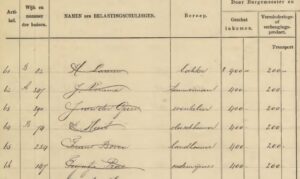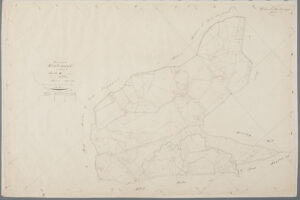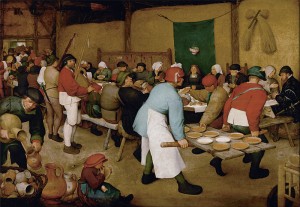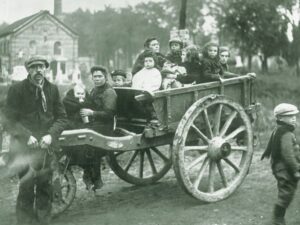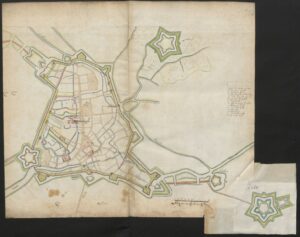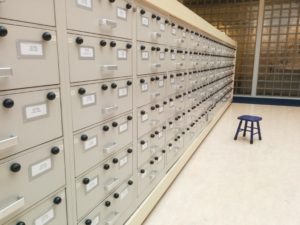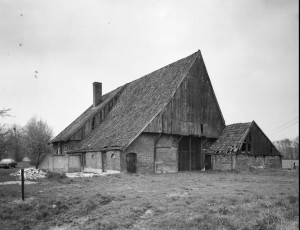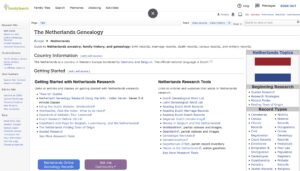In 1812, the Netherlands had more than 1,100 different municipalities. Since then, many have merged so we have about 350 left. See the Gemeentegeschiedenis website for an overview of all the municipalities that ever existed. Each of these municipalities created a wide range of records. Typical categories include: Records created by mayors, aldermen, municipal council, such as minutes of meetings, correspondence, municipal reports Various departments within the municipality … [Read more...]
Dutch term – Minuutplan
A minuutplan is a type of cadastral map created in 1832 to show the different plots within a section. Most sections were too large to display in one map, so there were often multiple minuutplans per section. See the article about Overview maps and minute maps for more information. … [Read more...]
Quick tip – Compare to the neighbors
To understand your ancestors, you need to study them in their context. One way to do that is to compare your ancestors to their neighbors to get some idea of their place in the community. Here are some research questions that may help you get to know your ancestors: Did your ancestors own their home? Did most people in the community rent or own? How much did your ancestors pay in taxes? How much did other people in the neighborhood pay? How old were your ancestors when they … [Read more...]
Dutch term – Vluchteling
A vluchteling is a refugee. The Netherlands was neutral during World War I, and saw many refugees from Belgium. Many municipalities in the southern provinces kept special registers to keep track of the refugees who stayed in their area. Nowadays, refugees settling in the Netherlands come from more distant places, like Syria. … [Read more...]
Dutch Genealogy News for July 2021
Here is an overview of all the new online sources, projects, and other news that was announced last month. Sources German marriage records of Dutch people are now available via WieWasWie. About 40% of these abstracts date from World War II, the rest are older. The Netherlands Institute for Military History published a database with 22,500 personal files of Dutch prisoners of War during World War II. Some of them include photos. The residence cards of Buren, Beusichem and Soelen have … [Read more...]
Quick tip – Open Journals
If you are interested in reading about Dutch history, check out the website Open Journals. It provides open access to several journals, including: BMGN - Low Countries Historical Review Early Modern Low Countries Historical Life Course Studies The Rijksmuseum Bulletin TSEG - The Low Countries Journal of Social and Economic History Articles in these journals are in various languages, many in English. … [Read more...]
Quick tip – Check the finding aid or catalog for scans
When you are searching for your ancestors, it's tempting to stick to searching for their name in an online index. But only a small fraction of records have been indexed. A larger part is available online as images that have not been indexed yet. These images are often available via the catalog or finding aids on the website of archives. Look for terms like inventarissen or archieven. In some cases, the records have not been scanned yet, but the catalog or finding aid has a button to order … [Read more...]
Dutch terms – “Huis en erf” and other land uses
In cadastral records and land records, you will often find a description how the land was used. Here are the most common terms. Dutch term English translation armenhuis poorhouse boomgaard orchard bos wood bouwland farmland gemeentehuis town hall hakhout coppiced wood heide heath hooiland hay land huis house huis en erf house and … [Read more...]
Seven ways to find sources on FamilySearch
FamilySearch is a vast website with genealogical information, including many sources for research in the Netherlands. FamilySearch is a free genealogy website, and requires a free registration. Many people are familiar with the website, but don't realize all the different ways you can find information there. Here are my seven favorite ways to find sources on FamilySearch. Search records You can search records by name. This will find records that have been indexed, which includes many … [Read more...]
